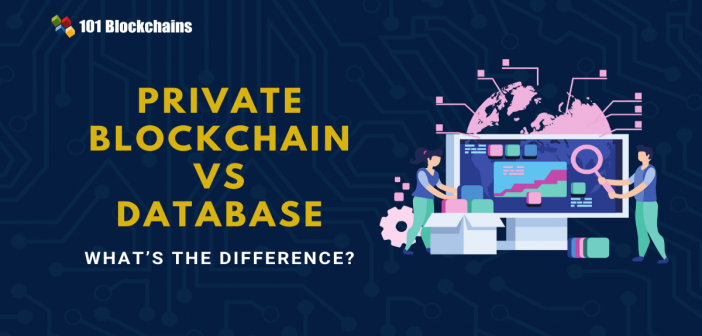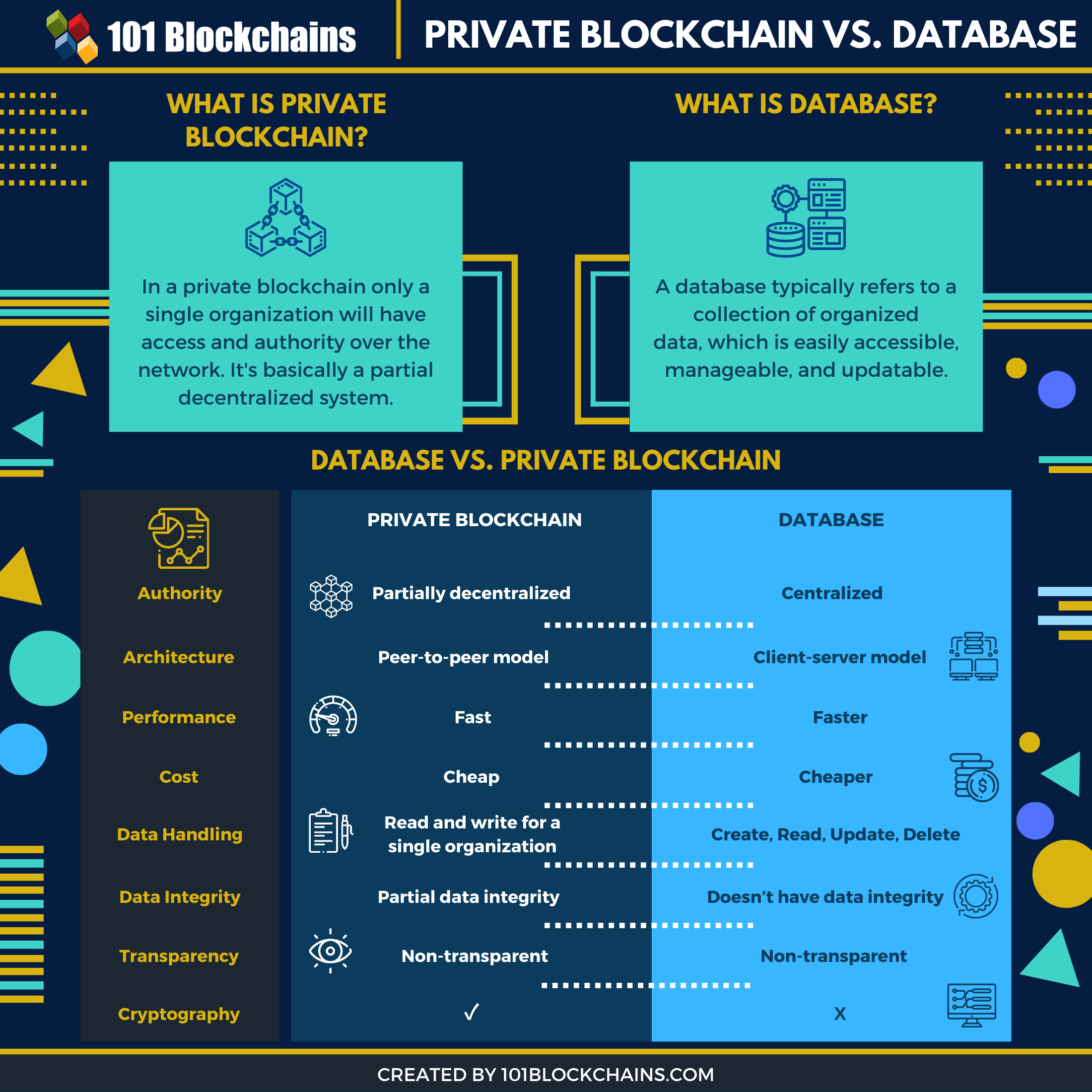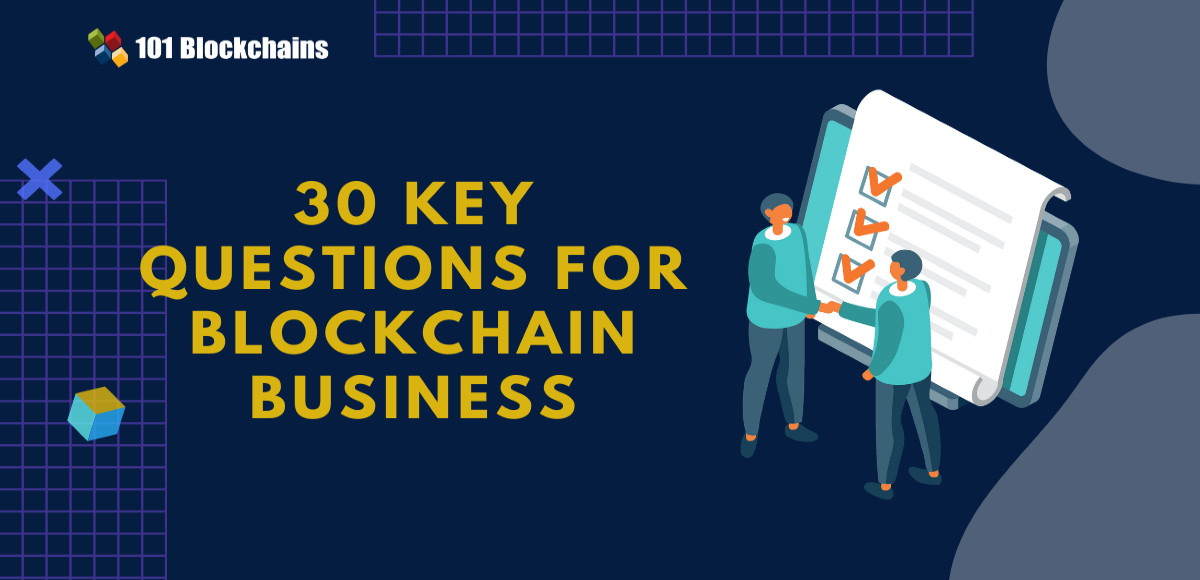Learn how blockchain truly works, master key definitions, and uncover what makes smart contracts so "smart." Dive into the fundamentals, gain valuable insights, and start your blockchain journey today!

- Opinions
Hasib Anwar
- on February 13, 2020
Private Blockchain Vs Database: What’s The Difference?
Due to the feature of having a distributed ledger, many think private blockchains and databases function as the same. This article clarifies the debate on private blockchain vs database and shows how these two technologies are completely different.
After the emergence of blockchain technology, there have been many curiosities to what the technology really can do for us. Even though many people think that blockchain is just one type, there are other variations for different purposes. However, confusion with private blockchain vs database is still ongoing among tech enthusiasts.
That’s why, today, I’ll bring the ultimate comparison of private blockchain vs database to help you better understand their differences.
Build your identity as a certified blockchain expert with 101 Blockchains’ Blockchain Certifications designed to provide enhanced career prospects.
What Is Private Blockchain?
Before I move into the private blockchain vs database comparison, let’s check out what private blockchain is. Basically, private blockchains are relatively different from public ones. Here, only a single organization will have access to the network. More so, the organization can also decide who can join the network or who can participate in consensus.
Well, at first, it doesn’t sound decentralized at all now, does it? It’s basically a centralized-decentralized type of system.
The significant difference is that the basic features of blockchain are still there, but there’s an added governance to the network. As the ledger is not public, you can’t get access without any proper authorization.
In reality, the governing authority does have a lot of control over how the technology would work in private blockchain solutions.
So, instead of fully public architecture, the private blockchain solutions would offer you a distributed and partial decentralized environment. This is because private blockchains DO use distributed ledger technology (DLT).
Anyhow, other factors like cryptography or immutabilities are still on the table. But the best part is that, if you want privacy for your transactions, now you can get it from private blockchain solutions.
There are many private blockchains available to be used nowadays. But Ripple is one of the popular ones that use a private blockchain to fuel their platform. And more so, their platform is suited for enterprise-grade solutions only.
There are other permissioned platforms like Hyperledger blockchain, Enterprise Ethereum, R3 Corda blockchain as well, but they are a bit different.
Let’s check out why private blockchain should be in your consideration next!
Please include attribution to 101blockchains.com with this graphic. <a href='https://101blockchains.com/blockchain-infographics/'> <img src='https://101blockchains.com/wp-content/uploads/2020/02/private-blockchain-vs-database.png' alt='private blockchain vs database='0' /> </a>
Features of Private Blockchain
-
Offers Supreme Privacy
One of the best features of a private blockchain is that it provides a high level of privacy for any enterprise. In reality, enterprises have to deal with a lot of sensitive information in business. Thus, if they get leaked, they would severely lose their business and brand value.
It’s a high risk for them, and that’s why they can’t use a public blockchain to boost their efficiency. That’s why private blockchains emerged in the first place. These mainly offer private transaction processes and helps organizations keep their information for authorized persons only.
Let’s check out the next benefit in this private blockchain technology vs database comparison guide.
-
More Efficient Performance
Typically, private blockchain platforms take up a lot less energy compared to public ones. But how? Well, it all depends on the consensus protocols they are using. In reality, public blockchains typically use power-consuming consensus protocols. For example, proof of work is one of the highest energy-consuming consensus algorithms at the moment.
But private blockchain doesn’t use this type of consensus. Instead, they use some kind of voting consensus or other forms of consensus algorithm to reach an agreement over a transaction.
-
Less Volatile Network
In reality, private blockchains aren’t volatile at all. As there is a governing authority to overlook any discrepancies, there won’t be any issues controlling the transaction fee rates. Another great news is that most of the private blockchain doesn’t have any native currencies. So, it means you won’t have to deal with the cryptocurrency’s unnecessary volatile nature.
In an enterprise blockchain environment, cryptocurrencies aren’t reliable to offer a sustainable business outcome in the long run. Thus, with a private blockchain, you get stability as you desire.
Let’s check out the next benefit in this private blockchain technology vs database comparison guide.
-
Organizational Empowerment
Well, public blockchains are more focused on user empowerment. But organizations need empowerment as well. In reality, our business models, and the way we conduct them is far more different. We don’t even know if we can ever reach full decentralization at every level.
In private blockchains, you have to follow the regulations and rules of that specific enterprise. It’s necessary for the betterment of that organization, and private blockchain can easily deliver it.
Curious to learn about blockchain implementation and strategy for managing your blockchain projects? Enroll Now in Blockchain Technology – Implementation And Strategy Course!
Why Private Blockchain?
You must be wondering why consider private blockchains in the first place? Well, it’s because this type of model comes with its fair share of benefits. Let’s check them out!
-
Saves A Lot of Costs
First of all, private blockchain solutions save a lot of costs in the long run. Running and maintaining a public blockchain takes a lot of time and resources. More so, enterprises can’t use public blockchain for their internal networking system. Why?
Well, because if one of their competitors can just get in the network and see what they are up to, the company would lose its competitive edge. More so, for security purposes, there needs to be extra privacy for confidential files as well.
By using a private blockchain, they can easily save a lot of costs.
-
Offers Lower Transaction Fees
As private blockchain doesn’t have a lot of users or doesn’t seem to have scalability issues, the transaction fees are low. Basically, the transaction fee rates get higher as the demand for transactions rises in a network by multiple parties.
But that’s not the case for private blockchains. In these models, you’ll always get very low transaction rates.
-
Network Regulations
It comes with network regulations, and every user in the system has to follow all those regulations. Previously, public blockchains didn’t have any regulations, and the scopes of blockchain for enterprises seemed bleak.
Thus, as you can define the regulations from the start, it’ll be easier for an enterprise to upgrade to blockchain and use all of its features.
-
No Criminal Access
In private blockchains, you won’t have to worry about any criminals getting access to your network. In reality, many criminals use cryptocurrencies to pay up for crimes on the dark web. But as private blockchains have authorizations, they won’t get access to it.
Start your blockchain journey Now with the Enterprise Blockchains Fundamentals
What is a Database (DB)?
A database typically refers to a collection of organized data, which is easily accessible, manageable, and updatable. In reality, all computer databases tend to contain aggregations of information, records, or files such as sales transactions or customer interactions, and so on.
There are many kinds of databases. But the traditional database is nothing but a table with rows and columns that are indexed. More so, companies use this to make it easier to find information using NoSQL or SQL queries.
On the other hand, graph databases try to use edges and nodes to define any kind of relationship between the entries or the queries on specific metrics.
Anyhow, the database manager is responsible for offering access to users with the ability to write or read, delete, or update the database.
However, the accurate feature of databases is that they are centralized. It means that there’s a higher authority that can easily change your entries if they want to. In reality, this makes the data unreliable and gives rise to corruption.
On the other hand, now, some databases offer ACID compliances to offer more security to the information.
Advantages of Database Management System
The Database management System actually allows the retrieval, access, and use of the information on the system with security protocols. More so, it’s responsible for data integrity and other features. So, let’s see what the advantages of a typical database are.
-
Better Data Transferring
In a database, users can get access to better-managed data. In reality, it helps the users to quickly query a piece of information they need and have a fast response time. More so, they can also help users to make changes if it’s necessary for the environment.
-
Data Security
Databases are used globally. There’s a lot of pressure on a company’s database when many users are trying to transfer data or share data on it at the same time. Thus, the need for security rises to a great extent.
Using the Database Management System, enterprises can get the security and privacy they need. However, you have to know that even though it does offer higher security protocols. It can still allow users to make unauthorized changes.
Also, most of the time, the security protocols aren’t enough to keep the hackers out of the database.
-
Lower Costs
In reality, the cost of setting up a database is fairly cheap. As it’s highly available technology, any company can set up its databases at a minimal cost. However, maintaining the database afterward is what the costs might start to add up.
When scaling, a company has to increase its database capacities as well. In reality, the bigger a database gets, the harder it becomes to manage it. And discrepancies start to rise as well. Scalability, on the other hand, is one of the key blockchain features.
Let’s check out the next benefit in this private blockchain vs shared database comparison guide!
-
Minimizing Data Inconsistency
A big feature of databases is that, as there are multiple tables within a network, one change in a table can affect another one on another table. If the other table isn’t updated as well, it creates data inconsistency.
However, if you properly design a database, it should automatically update other tables if you update a table linked to those. So, it can reduce the issue of inconsistent information as well.
-
Faster Data Access
Using the database, you can quickly query if you are asking a very specific question. The best part is that databases are extremely fast. In reality, they are also highly accurate. For example, maybe you want to know about a specific customer buying a specific product at a specific time.
All you have to do is to runs a simple query language, and you are done. The algorithms would just fetch you your answer instantly. In reality, databases really come in handy in customer services, and multiple customers have issues, and the agent can quickly look up what the issue is from the database.
Let’s check out the next benefit in this private blockchain vs shared database comparison guide!
-
Sharing Information
With the help of databases, you can also share certain information with a certain party. So, it’s not public property in any way. Thus, it offers you storage for storing all your sensitive information and giving access to only authorized personnel.
It can be a huge plus point when you are doing business with multiple parties.
-
Increased Productivity
With help from certain tools, you can easily make all the data in the databases into a piece of useful information, which will help users to make better, informative, and quick decisions. In reality, these small efficiencies actually make up for the success of a company.
-
Reducing Storage Space
Obviously, if you start storing all your paper-based information into databases, it will save you a lot of storage space. Typically, there’s a lot of paper-based trails that can be manipulated quite easily. But with databases, all of the information would be digitized.
As a result, you wouldn’t need to rely on the paperwork anymore. Even though making all your documents digital would be a pain at the start. After that hardship, everything would be seamless.
-
Simple
Using a database is rather simple. In reality, there are no additional complexities or issues. So, employees may need little to no training to start using databases for their work in the company. Let’s check out the next benefit in this private blockchain technology vs database comparison guide!
Aspiring to make a lucrative career as a blockchain developer but not sure how? Check the detailed guide Now on How To Become Blockchain Developer?
Private Blockchain vs Database: How Are They Different?
Basically, you may be thinking that a private database is a lot similar to typical databases. But in reality, there’s a huge difference between these two.
First of all, the underlying technology or the way they store information is completely different. So, there would be some obvious differences between them as well.
-
Authority
This is one of the major differences between private blockchain and database. Private blockchains are partially decentralized. It means that there would be a single entity looking after the system. So, in a way, it won’t offer you the full decentralization factor that you want.
However, the core features are still there.
On the other hand, databases are fully centralized. That means not only that there would be an authority to overlook all your entries. But they can also change or alter them as they please. In reality, by comparison, in a private blockchain, you get more freedom than in a typical database. A comparison between decentralized vs. centralized systems will give you a better idea.
-
Architecture
Private blockchains have a different architectural model. In reality, it doesn’t follow the typical client-server model as the primary architectural design of the system. Therefore, it uses a peer-to-peer network model to offer distributed nature in the network.
So, what does it mean? It means that rather than depending on the server to fetch all your queries, you can directly communicate with another user on the network.
On the other hand, databases follow the typical client-server model. It’s a rather outdated model that is more prone to attacks. More importantly, it’s rather slower than peer-to-peer models.
Let’s see the next difference in this private blockchain technology vs database comparison guide.
-
Performance
In reality, databases are far faster compared to a private blockchain. The issue is that even though private blockchains are new technologies, there’s a scaling problem. Databases don’t have that. In reality, it can scale to any extent it needs and still deliver the fast output you need.
But Private blockchains, on the other hand, will slow down if there is more pressure in the network than it can handle. So, basically, there’s a limit to the number of transactions it can handle every second. If you can stay within that range, then you can easily beat the database.
-
Cost
Another great difference is costing for both technologies. Databases are fairly cheap. Why? As it’s highly available technology, any company can set up its databases at a minimal cost. However, maintaining the database afterward is what the costs might start to add up.
However, all in all, compared to blockchain technologies, it’s still a lot cheaper. On the other private blockchains are a bit cheap compared to their public counterparts.
Keep in mind that all the computers or devices at present are used to using databases. So, when you want to switch to a completely different technology, you would have to make investments.
Let’s see the next difference in this database vs private blockchain technology comparison guide.
-
Data Handling
This is, by far, one of the top differences between both technologies. In a private blockchain, users are only allowed to read and write and nothing else. So, once data gets an entry into the ledger, no one can ever alter it in any way. This feature is called immutability, and blockchain maintains it at any cost. It is one of the biggest benefits of blockchain technology.
On the other hand, in databases, users can write, read, delete or update an entry even after it already got an entry into the system. It follows CRUD. SO, if you want, you can easily change or alter someone else’s entry if you have access to it.
In reality, this form of accessibility is actually not that great as it gives rise to corruption at every level.
-
Data Integrity
Databases lack data integrity at every level. How? Well, as you already know that anyone can alter the data if they can get access to it. So, there is no way that the database is capable of offering full data integrity at any level.
This is something that the business world keeps dealing with every day. There’s a lot of discrepancies in this type of system, and that costs greatly to an organization.
On the other hand, private blockchains have immutability. That does offer data integrity. However, as only a single organization manages the platform, the organization can override a transaction under certain rules. But I have to say, that’s highly likely. It’s one of the biggest problems blockchain solve.
Let’s see the next difference in this database vs private blockchain technology comparison guide.
-
Transparency
This point is rather different from others. Practically, both of the technologies aren’t transparent at all. Basically, public blockchains are actually fully transparent but not private ones. Why? Well, it’s because it allows users to keep private chains where they can privately transact. And more so, without proper authority, no one can see what is really going on in that private chain.
The same thing happens in databases. In reality, the entries in databases aren’t transparent or public property. You need to have access to see or interact with it. So, both of the systems aren’t transparent.
Let’s see the next difference in this database vs private blockchain technology comparison guide.
-
Cryptography
Private blockchains have cryptography to help secure all of their transaction records. What this technique does is that it encrypts the transaction information and makes sure no one can tamper with it. More so, it also makes sure that the hackers can’t get access to it in any way.
Whenever someone tries to alter an entry, it will separate the blockchain from the chain, so it can’t affect the overall data in any way.
It’s a highly functioning and great security measure. But in the database, you don’t see cryptography. More so, you won’t see any form of encryption at all. But why? Well, actually, databases have a lot of entries, and the algorithms that will query the database would have to decrypt every entry to fetch the answer. And that’s highly time-consuming.
Want to become a Cryptocurrency expert? Enroll Now in Cryptocurrency Fundamentals Course
Private Blockchain vs Database: Comparison Table
Private Blockchain Database
Authority Partially decentralized Centralized
Architecture Peer-to-peer model Client-server model
Performance Fast Faster
Cost Cheap Cheaper
Data Handling Read and write for a single organization Create, Read, Update, Delete
Data Integrity Partial data integrity Doesn’t have data integrity
Transparency Non-transparent Non-transparent
Cryptography ✔ X
Conclusion
In the end, I have to say, both the database and the private blockchain come with their fair share of features. In reality, database vs private blockchain only gives you a glimpse of how they are different from each other. It will help you decide which road to take.
However, you have to keep in mind that blockchain is slowly going to replace databases as they are truly becoming obsolete day by day. So, now or later on, you would have to switch to blockchain technology.
Anyhow, hopefully, this comparison offered you all that you needed to know. So, now it’s up to you to decide whether you want to implement blockchain or not.
*Disclaimer: The article should not be taken as, and is not intended to provide any investment advice. Claims made in this article do not constitute investment advice and should not be taken as such. 101 Blockchains shall not be responsible for any loss sustained by any person who relies on this article. Do your own research!





![Future of Blockchain: Predictions for 2022 [UPDATED] future of blockchain predictions](https://101blockchains.com/wp-content/uploads/2020/12/future-of-blockchain-predictions.png)


1 Comment
Hi HASIB ANWAR,
Thank for your sharing, your blog is very clearly and understandable, I almost got all the points what the private blockchain actually is.
But I have a small question about cryptography between database and private blockchain:
– “highly time-consuming”, In my opinion, both private blockchain and database will have to encrypt the data at the end and I think the difference of the times to encrypt those entries is negligible.
=> in this point, I think private blockchain better than database is the available cryptography integration of private blockchain